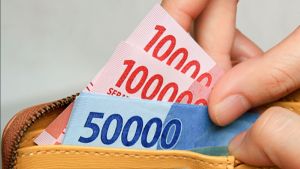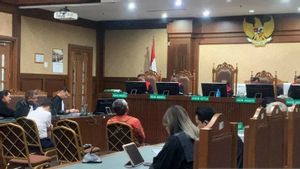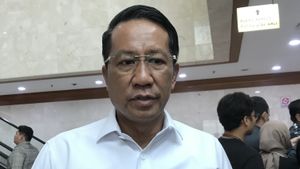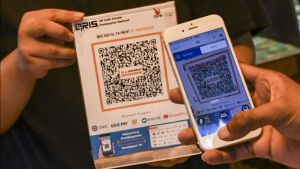JAKARTA - Micro, small and medium enterprises (MSMEs) are the pillars of the Indonesian economy. The contribution to the national economy is very large. This sector is known to be the largest job provider and an important player in local economic development.
Data from the Ministry of Cooperatives, Small and Medium Enterprises (KUKM) in 2018 shows that the number of MSME actors is more than the number of business actors in Indonesia. The number reaches 64.2 million or 99.99 percent of the total number of business actors. The absorption power of the workforce is also very high, namely as many as 117 million workers or 97 percent of the labor absorption power of the business world.
And gross domestic product reached 61.1 percent. This number is more than contributed by large business actors (38.9 percent), which amounted to only 5,550 or 0.01 percent of the total business actors.
Had decreased due to the impact of the Covid-19 pandemic, MSMEs resumed after the government provided support through the National Economic Recovery (PEN) program in 2020 and 2021. Funds of IDR 112.84 trillion have been enjoyed by more than 30 million MSMEs in 2020. And in 2021, the government has budgeted IDR 121.90 trillion to support MSMEs.
This PEN program is successful. Data from the Central Statistics Agency shows that as of August 2020 there was the creation of a new job opportunity with the addition of 0.76 million people who opened businesses and increased 4.55 million informal workers. The number continues to increase. Data from KUKM shows that the number of MSMEs reached 8.71 million units in 2022.
Of course, the increase in the number of MSMEs is a positive momentum in efforts to recover the national economy. To maintain this positive momentum while increasing national economic resilience, the government then encourages digital transformation efforts in the MSME sector. The government sees the need to carry out digital transformation because the digital economy will be the driving force for national economic growth.
Data shows that Indonesia is the country in Southeast Asia with the strongest and largest digital economy. Even the digital economy in Indonesia is projected to grow 20 percent from 2021 to 146 billion US dollars by 2025.
In 2022, the Ministry of Cooperatives and SMEs noted that the number of MSMEs that had entered the digital ecosystem reached 20.76 million units. An increase of 26.6 percent compared to last year's 16.4 million MSMEs.
This data shows that there are already 32.44 percent of the 64 million MSME units that have entered the digital ecosystem. The target of the Ministry of Cooperatives and SMEs is that the number of MSMEs entering the digital ecosystem by 2024 will increase to 30 million units.
In an effort to support the government's program to carry out digital transformation in the MSME sector, PT Yukk Kreasi Indonesia presents the YUKK Payment Gateway service. PT Yukk Kreasi Indonesia wants to cooperate with MSME players throughout the country to enter the digital ecosystem. Thus, the opportunity to compete in the global market becomes more open.
This is because the YUKK Payment Gateway service makes it easier for MSME players to develop their business because it provides various payment channels that can be used by customers anytime and anywhere, such as bank transfers, virtual accounts, credit/debit cards, e-money, digital wallets, QRIS, and payments directly at Alfamart, Indomaret, and Pos Indonesia.
"By providing YUKK Payment Gateway services, we want to take part in supporting and developing the digital economy in Indonesia. We want to make it easier for entrepreneurs or business people to run businesses or businesses, both MSMEs, and large-scale businesses. By providing qualified digital infrastructure, we encourage MSME players to easily penetrate the global market," explained the Co-founder and CEO of PT Yukk Kreasi Indonesia, Stevanus Rahardja, in Jakarta, Wednesday, March 1.
The convenience brought by YUKK Payment Gateway has increased the number of merchants joining. Not only merchants in the Jabodetabek area, but also in several cities in Java and Bali such as Surabaya and Denpasar. Until the beginning of this year, the number of merchants who became partners of YUKK Payment Gateway reached nearly 30,000 merchants. Most of the merchants are MSMEs.
"Why are we cooperating with MSME actors? Because MSMEs are the pillars of the nation's economy. Their contribution to the country's economy is very large. The data shows that MSMEs are able to absorb 97 percent of the total workforce and contribute 60.4 percent of the total existing investment," said Stevanus Rahardja.
Stevanus is optimistic that the YUKK Payment Gateway service can help strengthen the economic digitization program as launched by the government. If more and more MSME players enter the digital ecosystem, the value of the digital economy in Indonesia which is predicted to reach more than USD330 billion by 2030 can be achieved.
"There are many factors that make many MSME players not yet included in the digital ecosystem. It could be because of costs, it could be because they don't really understand digital technology, and it could be because of digital infrastructure. Well, we are here to answer this challenge because we have qualified infrastructure, transparent and cheap costs, and dashboards that are very easy to use," he explained.
The English, Chinese, Japanese, Arabic, and French versions are automatically generated by the AI. So there may still be inaccuracies in translating, please always see Indonesian as our main language. (system supported by DigitalSiber.id)









